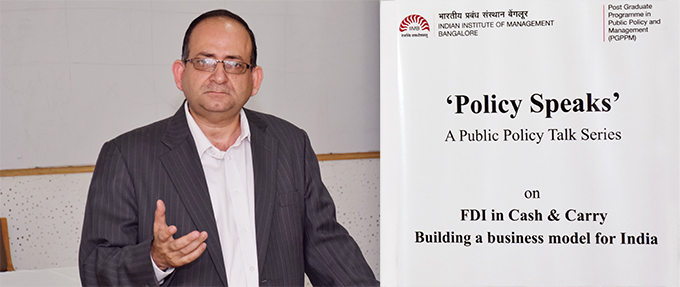‘FDI in retail is an asset; helps consolidate supply chain in India’

Policy clarity is the need of the hour, says Vishal Sehgal, Head of Corporate Relations, METRO Cash & Carry India

"Retail industry adds one million youth to the work force every month. Retail, at present, is what construction was to India 10-15 years ago," declared Vishal Sehgal, Head of Corporate Relations, METRO Cash & Carry India at the 'Policy Speak' lecture on December 3, 2014, at IIM Bangalore.
Addressing students of the Post Graduate Programme in Public Policy and Management (PGPPM) on 'FDI in Cash & Carry - Building a business model for India', Vishal Sehgal analyzed the FDI policy in the past, its repercussions in the 21st century and the challenges of a public policy practitioner.
"There are only four major players in Cash & Carry in India; METRO being the largest with 16 outlets in 12 cities employing over 100,000 people. So, the government's biggest concern about job creation is well put to rest," he said.
According to him, the 1.25 crore 'kiranas' (grocery shops) in India are functioning at very basic costs. They are "on the borderline of bankruptcy". There are numerous instances where the owners of 'kiranas' are renting out space and working for a living, he claimed.
"FDI in retail is an asset which will help merge supply chain in India. In our stores, 85% of the products are sourced from India and fresh vegetables and fruits are sourced within an 80-km radius of our stores, so farmers will benefit," he said.
To a query, as to the satisfaction quotient of the farmers, he said the Pay Direct Card for farmers that METRO had introduced in June 2012 was a hit. "When METRO purchases products from a farmer - at an accepted quantity and price, payments are credited directly into a farmer's account in less than a day. This doorstep procurement has eliminated the middleman factor; it ensures accuracy of payments and in turn improves farmers' credit opportunities with banks," Sehgal explained.
Drawing attention to the challenges faced by large retailers like METRO and Wal-Mart, he said, "Getting right land at the right price is one of the biggest impediments we face. Then, there are too many policies, most of them draconian. With such discouraging facts, how can any retailer think of investing here? If the Modi government mandates a clear FDI policy, then the real players will enter the field. Till then it will be a Catch 22 situation."
‘FDI in retail is an asset; helps consolidate supply chain in India’
Policy clarity is the need of the hour, says Vishal Sehgal, Head of Corporate Relations, METRO Cash & Carry India

"Retail industry adds one million youth to the work force every month. Retail, at present, is what construction was to India 10-15 years ago," declared Vishal Sehgal, Head of Corporate Relations, METRO Cash & Carry India at the 'Policy Speak' lecture on December 3, 2014, at IIM Bangalore.
Addressing students of the Post Graduate Programme in Public Policy and Management (PGPPM) on 'FDI in Cash & Carry - Building a business model for India', Vishal Sehgal analyzed the FDI policy in the past, its repercussions in the 21st century and the challenges of a public policy practitioner.
"There are only four major players in Cash & Carry in India; METRO being the largest with 16 outlets in 12 cities employing over 100,000 people. So, the government's biggest concern about job creation is well put to rest," he said.
According to him, the 1.25 crore 'kiranas' (grocery shops) in India are functioning at very basic costs. They are "on the borderline of bankruptcy". There are numerous instances where the owners of 'kiranas' are renting out space and working for a living, he claimed.
"FDI in retail is an asset which will help merge supply chain in India. In our stores, 85% of the products are sourced from India and fresh vegetables and fruits are sourced within an 80-km radius of our stores, so farmers will benefit," he said.
To a query, as to the satisfaction quotient of the farmers, he said the Pay Direct Card for farmers that METRO had introduced in June 2012 was a hit. "When METRO purchases products from a farmer - at an accepted quantity and price, payments are credited directly into a farmer's account in less than a day. This doorstep procurement has eliminated the middleman factor; it ensures accuracy of payments and in turn improves farmers' credit opportunities with banks," Sehgal explained.
Drawing attention to the challenges faced by large retailers like METRO and Wal-Mart, he said, "Getting right land at the right price is one of the biggest impediments we face. Then, there are too many policies, most of them draconian. With such discouraging facts, how can any retailer think of investing here? If the Modi government mandates a clear FDI policy, then the real players will enter the field. Till then it will be a Catch 22 situation."
